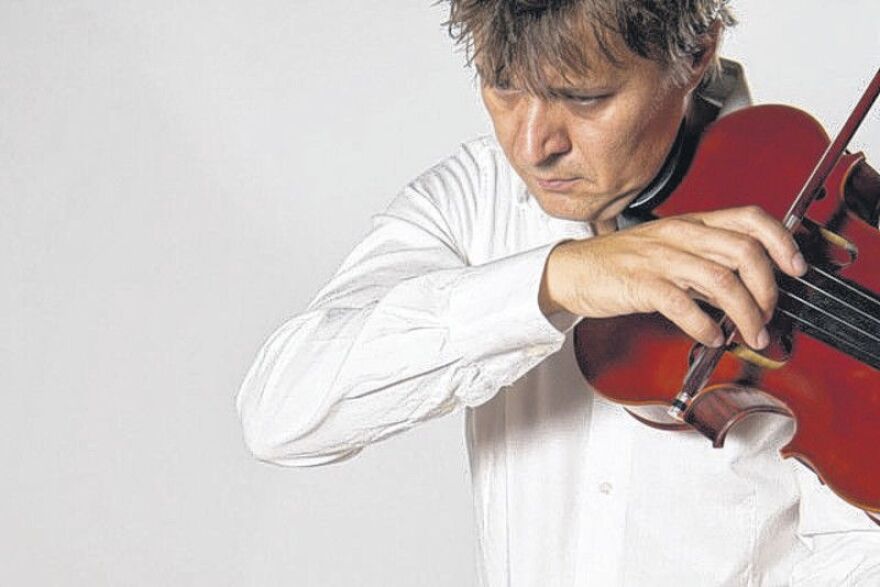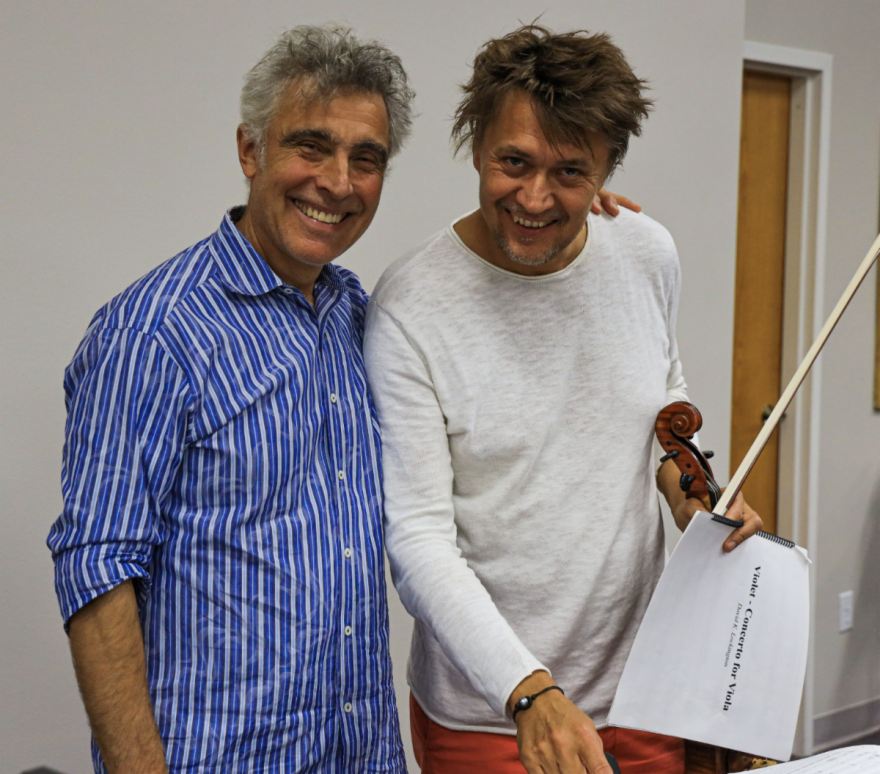This weekend, the Great Lakes Chamber Orchestra will give the world premiere performance of the Violet Viola Concerto. Composed by David Lockington and featuring the GLCO's music director Libor Ondras as the viola soloist, the piece was commissioned by Robert Pattengale.
David Lockington and Libor Ondras recently spoke with Classical IPR about the upcoming world premiere of the Violet Viola Concerto.
Listen to the entire conversation below, along with excerpts from an early reading of the work and a preview of the viola cadenza in the first movement.
An edited transcript of the interview also appears below.
Thanks to Judy Zorn and Timothy Heldt for additional support.
The Great Lakes Chamber Orchestra will give the world premiere performance of the Violet Viola Concerto on Saturday, September 21 at 7 p.m. at the Great Lakes Center for the Arts in Bay Harbor. Join Ondras and Lockington at 5:45 p.m. for a pre-concert talk. Click here for more information.

On who Violet is and why she gets a viola concerto
David Lockington: Violet is our granddaughter who was born February 6, 2018. She is our first granddaughter. Two days after she was born, a lullaby appeared in my head as I was waking up, and I wrote it down. I took it to Libor [Ondras], and we played it together, and it became the focal point of the viola concerto.
[Violet] is pretty familiar with her melody. I sang it to her a lot, and she's heard it around as we’ve played it in different forms. For her it's sort of soothing. In fact, there was one time that was just really beautiful: I was singing her lullaby and rocking her, holding her, walking, and she fell asleep. And that's actually how the lullaby movement of the concerto ends – there are pauses between phrases as you can imagine Violet falling asleep.
On the first movement of the concerto
DL: I started writing the concerto in January [of 2018], and I was pretty close to finishing the first movement when Violet came. The first movement is a very different feeling [than the lullaby in the second movement]. It's entitled Appassionata, so it's a passionate movement.
Libor [Ondras] and I been friends for years, and we talked a lot about where he came from - Slovakia - and other pieces that I've written that have a kind of Eastern European feeling about them. There's a sort of a tension in this movement that I relate to a certain kind of European expression. The material is exposed at the beginning by the solo viola. That's the material that is developed pretty thoroughly all the way through the movement.
The very first thing that I wrote was the second theme in the first movement, and that becomes developed in the last movement, together with the lullaby theme. There's a lot of flexibility in the way the first movement is written - the tempo is changing quite a lot, the mood swings are quite strong. It's a movement of great passion and great tension.
On the third movement of the concerto
DL: The third movement starts with a gentle reminder from the clarinets of the theme from the first movement. Then it’s almost like a sort of stamping kind of dance with a very vigorous feel. It starts with a series of dances that recaps the Violet theme [the lullaby from the second movement] and an almost Scottish kind of context. It builds and builds, there’s some metric modulation that takes us into a kind of developmental travelling feeling. It reaches a quite a big climax, after which there is a very gentle, soft moment that combines a couple of themes from the first and second movements. After that. everything breaks into this joyful celebration. Listening to it, you'll have a great sense of uplift and celebration. Just before the very end, the main theme that begins the first movement is repeated, and then it's a race to the end for everybody in a really fun way.
On the commission from Robert Pattengale for this work
DL: Libor had asked my wife Dylana Jensen and myself to join him in a chamber program last January in Harbor Springs, which featured a couple of pieces that I had written. Bob Pattengale, who started the Great Lakes Chamber Orchestra nearly 20 years ago, came up to me and asked me if I write something. I thought the best thing [for this commissioned piece] would be to feature Libor. He is such an exceptional violist - and a wonderful violinist too - but he has such deep training and great virtuosity. I showed this piece [the Violet Viola Concerto] to some other violists who said they didn’t even think they could play the last movement. It's very difficult, but Libor can do anything on the viola.

On premiering a brand new work
Libor Ondras: It's a mixture of feelings, of course. There’s the trepidation, there’s the excitement, the responsibility, and the hope that what I’ll do is going to pay the way for this concerto to be shared by humanity in the future and becomes what it rightfully should be, which is an important contribution to the viola repertoire.
When I started working on it, every little bit that David shared with me was really exciting as we explored the viola’s sound and the thematic material. When I got the final edited part, it became the responsibility: how do I best render the emotional content of the music?
When we rehearsed this past weekend, I could feel the infectious excitement of the piece as it spread from the viola to the conducting podium to the musicians. They all came back with smiles on their faces and commented about how exciting the piece is. So I know that we’ve got something of a gem that is going to speak to the audience.
On working with David Lockington as he was writing the piece
LO: David's such as deep thinking musician and such a skilled string player himself, there were a few spots where I would recommend, “What if we did this grouping or this bow change?” Some of those he liked, and some of those he said, “Oh no, let's just go with the original idea.” I haven't really done too much editing on my part. That's a unique situation - the fact that we live the same city and are such close friends, and we talk almost on a daily basis. Maybe I don't realize how much of that [editing] has actually happened in conversations rather than editing the final version.


